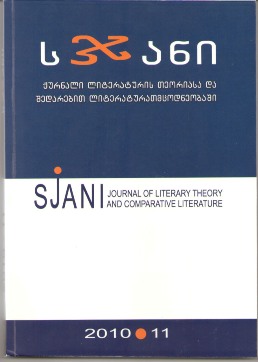გიორგი ლეონიძის ლექსის ექო („მე მისთვის ვგეშავ ლექსის მიმინოს....“)
The Echo of Giorgi Leonidze's Verse ("I train for him the Falcon of the Verse....")
Author(s): Tamar BarbakadzeSubject(s): Literary Texts
Published by: ლიტერატურის ინსტიტუტის გამომცემლობა
Keywords: interpretation; metaphor; hermeneutics; the verse- Falcon
Summary/Abstract: This paper deals with the issues of the interpretation of Giorgi Leonidze’s verse and the explanation of one concrete metaphor “falcon of the verse”. Giorgi Leonidze as a poet and Giorgi Leonidze as a researcher of the Georgian verse so naturally blend with each other that during the interpretation of his poetry, a verse and concrete metaphor often appear as explaining and clarifying each other. A study of Leonidze’s verse from the viewpoint of hermeneutics and reception aesthetics puts a new slant on poet’s recipient – a reader or an observer. Moreover, if this reader or observer is a poet, on the one hand and on the other hand, is a poet and researcher of the verse and the third – professional versifier. Here we mean Archil Sulakauri, Emzar Kvitaishvili and Akaki Khintibidze, and for the analysis we regard a concrete artistic image, the metaphor “falcon”. Artistic image of a “falcon” interpreted by the poet, poet-researcher and versifier on the basis of our “perception” and “observation” has become the pretext of a new interpretation and observation. Archil Sulakauri’s verse-interpretation “Just Once” is dedicated to the memory of Giorgi Leonidze. It is written in heterosyllabic rhyme and attracts attention by the rhyme of folk poetry: “high shairi” (4/4) at seven syllables (4/3; 2/5) is included in each stanza; it is written with interval rhythm (xaxa). By this verse Archil Sulakauri presents the talk between Giorgi Leonidze and the transient world the central image of which is the flown falcon. In the verse “Just Once…”, Archil Sulakauri captivates the reader with Giorgi Leonidze’s poetic image, reminiscences and allusions. Archil Sulakauri’s verse “Just Once..” resonates with Giorgi Leonidze’s verse. The title “Just Once…” means the time of the verse creation occurs only once, only once the poet beholds unique, beautiful moment the creator is waiting for like a falcon in ambush and tries to put it in his verse. Archil Sulakauri keeps the echo of Leonidze’s poetry in his verse and tries to preserve the poet’s intonation and even timbre along with the metre (5/; 4/4; 2/5; 4/3) for the reader. The interpreter of Leonidze’s verse is not remained unnoticed neither by the researchers nor by the poets in the poet’s not as much known verse “In the Mountains of Mtskheta” (1935). It is unrhymed, blank verse, the absence of rhythm is not typical for Giorgi Leonidze’s poetry and with this verse the poet intends to bring his thinking to the reader. Akaki Khintibidze with reference to Illia Chavchavadze’s view that “the raise of the voice” in Georgian verse is the compensation for the lack of rhythm.
Journal: სჯანი
- Issue Year: 2010
- Issue No: 11
- Page Range: 86-94
- Page Count: 9
- Language: Georgian

